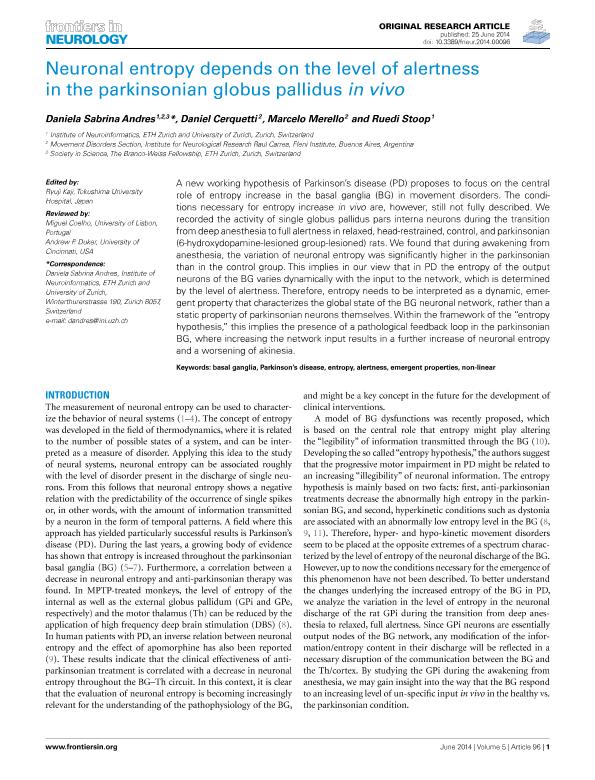Artículo
Neuronal entropy depends on the level of alertness in the parkinsonian globus pallidus in vivo
Fecha de publicación:
06/2014
Editorial:
Frontiers
Revista:
Frontiers in Neurology
ISSN:
1664-2295
Idioma:
Inglés
Tipo de recurso:
Artículo publicado
Clasificación temática:
Resumen
A new working hypothesis of Parkinson's disease (PD) proposes to focus on the central role of entropy increase in the basal ganglia (BG) in movement disorders. The conditions necessary for entropy increase in vivo are, however, still not fully described. We recorded the activity of single globus pallidus pars interna neurons during the transition from deep anesthesia to full alertness in relaxed, head-restrained, control, and parkinsonian (6-hydroxydopamine-lesioned group-lesioned) rats. We found that during awakening from anesthesia, the variation of neuronal entropy was significantly higher in the parkinsonian than in the control group. This implies in our view that in PD the entropy of the output neurons of the BG varies dynamically with the input to the network, which is determined by the level of alertness. Therefore, entropy needs to be interpreted as a dynamic, emergent property that characterizes the global state of the BG neuronal network, rather than a static property of parkinsonian neurons themselves. Within the framework of the "entropy hypothesis," this implies the presence of a pathological feedback loop in the parkinsonian BG, where increasing the network input results in a further increase of neuronal entropy and a worsening of akinesia.
Archivos asociados
Licencia
Identificadores
Colecciones
Articulos(SEDE CENTRAL)
Articulos de SEDE CENTRAL
Articulos de SEDE CENTRAL
Citación
Andres, Daniela Sabrina; Cerquetti, Daniel; Merello, Marcelo Jorge; Stoop, Ruedi; Neuronal entropy depends on the level of alertness in the parkinsonian globus pallidus in vivo; Frontiers; Frontiers in Neurology; 5; 6-2014; 1-9; 96
Compartir
Altmétricas




